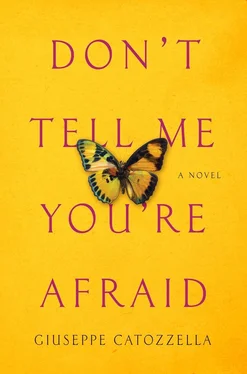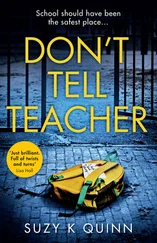I go back inside to get some water for her friend as well.
Then I try to get some sleep outside in the sun during the day, because at night I like to watch the stars and I don’t sleep. I may have rested just a couple of hours total; I’m too itchy with excitement. The sea conveys an energy I’ve never felt before; I’ve been waiting to see it since I was a little girl and went to glimpse it from afar with Alì and Hodan. I’ve been waiting for it a long time.
I keep to myself and don’t speak to anyone. Suddenly a girl comes up to me, wanting to chat.
“Are you Somali?” she asks. As I had done with Taliya. I pretend I don’t hear her. “Are you Somali?” she repeats. So I turn to her, nod my head “yes,” and motion that I don’t feel like talking. I want to be alone, just me, the sea, and the future. Just the three of us. Like me, Hodan and Alì, when we were little.
Then it happens.
Again. I can’t believe it’s really happening, but it happens.
Iblis, the devil, must have a hand in it, because the boat’s engine fails. In the middle of the third day. May a thousand pounds of stinking shit fall on your heads, so fetid you’ll never be able to wash away the stench.
We slow down and then stop.
I can’t believe it. It can’t be too much farther to the Italian coast. Yet we are stopped. We remain at a standstill for about fifteen hours.
Fifteen hours are endless if you know you are just a step away from the goal line. If, like me, you’ve been traveling for a year and a half, counting Addis Ababa. With the adrenaline I am producing, fifteen hours standing still is a time you can’t even imagine. It’s as if at the end of a race, just when there’s one step left to go, one final stride to plow through the finish line, you were to run up against a transparent wall.
Some people have started raving. Others have begun calling upon Allah. The traffickers, all six of them, come down on deck and restore calm with the use of clubs. Shut up, hawaian !
“If you shout, for sure we won’t get to Italy,” they say.
After fifteen hours an Italian boat finally comes.
All together we begin waving our arms, jumping and singing, cheering, hopping up and down and jumping some more, and in the throes of a collective, uncontrollable euphoria, we all move to the same side, where the Italians are.
Some actually scramble up on the railing, wanting to jump into the water and swim out to the boat. With all the weight on one side, the boat is in danger of listing, of capsizing in the sea. Using a bullhorn, one of the traffickers shouts at us to return to our places.
Slowly almost everyone backs off, except a few who remain clinging to the railing. Two already have their legs over the side, ready to jump.
Then we get it. Everything becomes clear.
They won’t tow us, no.
Some are saying that they’ll never rescue us and bring us to safety in Italy. We spend an hour like that, the two boats facing each other, maybe fifty yards apart, bobbing on the sea, the Italian captain speaking to our trafficker via radio.
On our boat, the rumor that they are going to bring us back circulates from ear to ear. They’re going to call the Italian police and take us back to Tripoli. Or maybe Kufra. Some of us are terrified. Others depleted.
Someone starts shouting, “Noooo, you bastaaaaaards!” at the top of his lungs, as if the sound of his voice could reach the Italian vessel. Instead it’s lost somewhere amid the surging, increasingly angry waves.
Others move back to the rail again, threatening to jump with unmistakable gestures: They don’t want to go back.
Then a decision is made on the Italian boat. The captain orders ropes to be thrown over the side, to be ready in case someone jumps.
The ropes hit the water with heavy plops, cutting cleanly through the towering, foamy waves crashing against the side of the vessel. There are about a dozen ropes in all. A dozen heavy plops, along the entire length of the hull.
Then it starts. It starts, and there’s no going back.
A man from our floating wreck suddenly jumps into the sea. Without warning. No one could have anticipated it. The plop this time is much louder, as if a refrigerator has fallen in.
Everything halts, suspended; no one dares breathe a word. Time expands in that silence, on the brink. It’s a state of waiting. Pure waiting. For something to happen. Whatever it is.
Very soon another man follows the first one.
Someone yells at him not to jump. “The sea is rough; the waves will swallow you,” somebody else shouts.
Only at this point do a lot of us wake up and hurry over to the rail; the decrepit tub lists again.
Then yet another dives.
There’s no way of knowing where the next person will jump from; everyone looks around to see if there will be another one. They look like fish dazzled by an intense, million-watt light, heads snapping left and right.
Now suddenly it’s a woman who jumps.
No one can really believe it, but there are four people in the water who are struggling as hard as they can to reach the ropes. Two are swimming like mad, with broad, noisy strokes. The other two, including the woman, wrapped in veils that billow and swirl as she enters the water and resurfaces, are moving convulsively, their gestures spasmodic; it’s clear to everyone that they don’t know how to swim.
The water is choppy: It’s an angry sea.
“Come back!” someone shouts.
“Don’t be crazy; get back here!” somebody else yells.
Since the four bodies went into the sea, the waves seem even more towering, even rougher than before. I’m up against the rail like everyone else and I glance back at my aunt, who has come out on deck.
Then I look at the sea.
My sea.
She immediately understands and moves toward me.
Maybe it’s written in my eyes, but somehow she understands.
“No!” is all she says.
“ Nooo! ” she says again.
She says it, but I can’t hear her voice. I only see her lips moving.
Maybe I say something to her; maybe I tell her, “I’m not going back. Ever.” But I’m not sure my voice really comes out.
Then a force greater than me makes me climb onto the rail. I don’t know where it comes from; I don’t know anything. It’s that force that seizes me and makes me straddle the rail. It’s not me, it’s that force.
Aunt Mariam tries to tug me back, gripping my T-shirt, “Nooo! Samia, no!”
I swing one leg over.
Then the other.
Down below me is the sea. At last, the sea. And I can go in, and no one can stop me. For the first time in my life I can be embraced by all that water, I can swim in it, as I’ve always wanted to do.
Now I’m sitting on the edge of the rusty old tub, gazing at that infinite expanse, at the sea. I look at the ropes. I look at the sea.
I turn around.
I didn’t even realize what I was doing. Aunt Mariam is behind me; she keeps pulling at my T-shirt and crying; I see her lips form a sound that I can’t hear.
Then it happens. Again it happens.
I’m driven to life by this force that’s seized me and decided to take me in hand.
It’s a long way down, as every leap to freedom should be.
The water is icy cold and even rougher than it seemed from above.
I slice through the surface and reach the lowest point before the natural reascent. I open my eyes. There’s a world of bubbles above me. There are slow, larger ones close to my head and small, very tiny ones racing swiftly toward the light, up to the surface. Hsss hsss hsss hsss . To my right and to my left, the dark shapes of the two vessels.
I thrust with my feet and rise back up. I emerge into the air and look around for the ropes.
I don’t know which is our boat and which is the Italian one. I try to stay calm, while all around the sea is breaking over me, wave after wave.
Читать дальше




![Ally Carter - [Gallagher Girls 01] I'd Tell You I Love You But Then I'd Have to Kill You](/books/262179/ally-carter-gallagher-girls-01-i-d-tell-you-i-lo-thumb.webp)







